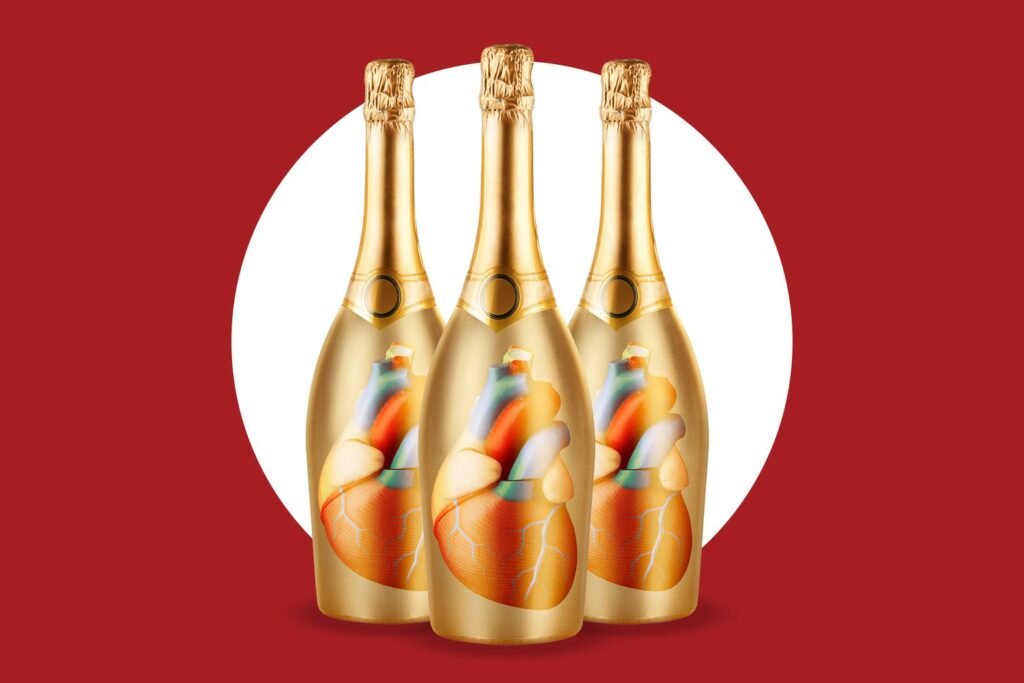From reducing the risk of sudden cardiac arrest to potentially improving heart health, Champagne has been making headlines for its unexpected health benefits. A recent study published in the Canadian Journal of Cardiology found that moderate consumption of Champagne and white wine could be associated with a reduced risk of sudden cardiac arrest. The study, which analyzed data from over 500,000 individuals, revealed that lifestyle factors such as positive attitude, healthy body weight, high fruit intake, and moderate alcohol consumption could play a role in preventing sudden cardiac arrest.
The protective association between Champagne and a reduced risk of sudden cardiac arrest is believed to be linked to the beverage’s polyphenol content. Polyphenols are a group of naturally occurring plant compounds that have been shown to improve vascular function, reduce inflammation, and increase HDL ‘good’ cholesterol, all factors that contribute to a healthier heart. Additionally, Champagne and white wine also contain protocatechuic acid, an antioxidant known for its potential in improving heart health by reducing free radicals in the body associated with chronic illness and heart disease.
While Champagne and white wine have shown promising cardiovascular benefits, it’s important to note that excessive alcohol consumption can still pose serious health risks. Red wine, for example, contains resveratrol, a type of polyphenol that may lower blood pressure, protect heart blood vessels, and decrease blood clots, thereby reducing the risk of heart disease. However, like Champagne, moderation is key when it comes to reaping the benefits of red wine.
So, how much Champagne should you drink to enjoy these potential benefits? The study did not provide specific guidance on consumption levels, but experts recommend moderate consumption, which equates to up to two drinks a day for men and up to one drink a day for women. It’s important to keep in mind that one standard drink is equivalent to five ounces of wine, 12 ounces of beer, or an ounce and a half of spirits.
Despite the potential cardiovascular benefits of alcohol, it’s essential to consider the negative health effects as well. Alcohol consumption can have adverse effects on various body systems and is associated with risks such as liver disease, cognitive impairment, and mental health issues. It’s crucial for individuals to evaluate their own health status and consult with healthcare professionals to determine whether moderate alcohol consumption is appropriate for them.
In conclusion, while Champagne and other forms of alcohol may offer certain health benefits, moderation is key. It’s always best to prioritize overall health and well-being when making decisions about alcohol consumption. Alcohol consumption is a common social activity, but it’s important to be aware of the potential health effects before reaching for that next glass. Here are some of the most significant health effects to consider:
1. Decreases brain activity:
Alcohol is a psychoactive substance and a central nervous system depressant, which means it lowers neurotransmitter levels in the brain and slows down brain activity. This can lead to changes in mood, awareness, feelings, behavior, muscle functioning, and even cognitive damage when consumed in excess.
2. Increases risk of liver disease and stomach cancer:
Excessive alcohol consumption can overwhelm the liver’s ability to detoxify the body, leading to adverse health outcomes such as fatty liver disease, hepatitis, chronic liver disease, and even stomach cancer. Alcohol is a known carcinogen at high doses, making it important to consume in moderation.
3. Disrupts the gut microbiome:
Research suggests that alcohol can damage the intestinal lining and increase gut permeability, allowing harmful toxins and pathogens to enter the bloodstream more easily. This disruption of the gut microbiome can lead to inflammation, digestive issues, and even chronic diseases.
4. Disturbs sleep:
Alcohol disrupts rapid eye movement (REM) sleep, which can lead to increased drowsiness the following day. While alcohol may initially promote relaxation, it actually reduces melatonin production, a hormone that regulates sleep-wake cycles, further disrupting much-needed shuteye.
To mitigate the potential health risks associated with alcohol consumption, here are some tips for healthier drinking habits:
– Alternate with water: For every glass of alcohol, have a full glass of water to stay hydrated.
– Drink with meals: Consuming alcohol with food can slow down its absorption into the bloodstream, helping you avoid feeling intoxicated too quickly.
– Sip slowly: Taking your time to sip and eat slowly can help with digestion and moderation of alcohol intake.
– Reduce alcohol strength: Consider diluting your drinks with soda water or adding extra ice to decrease the actual alcohol content.
By being mindful of these health effects and adopting healthier drinking habits, you can enjoy alcohol in moderation while taking care of your overall well-being.


